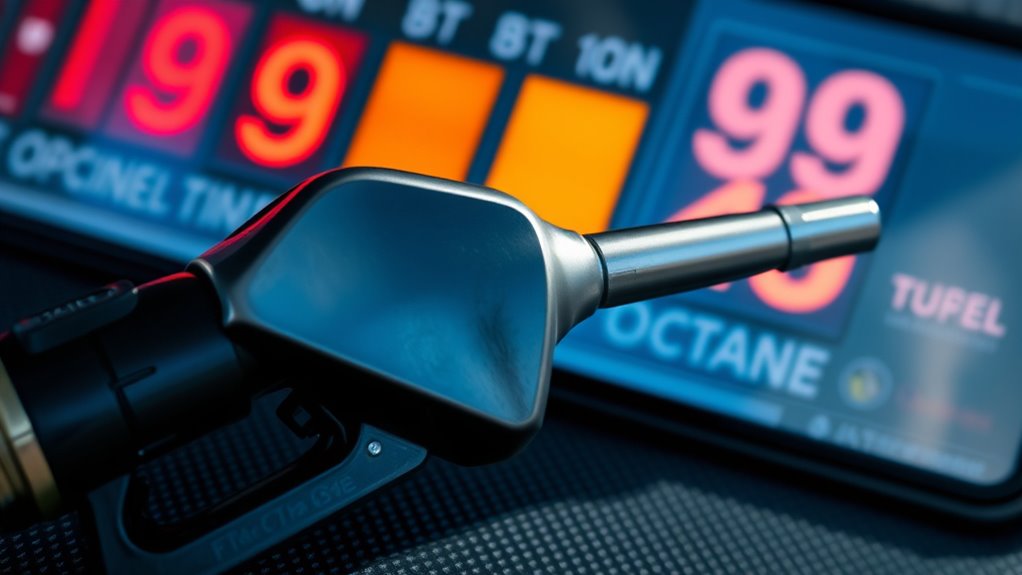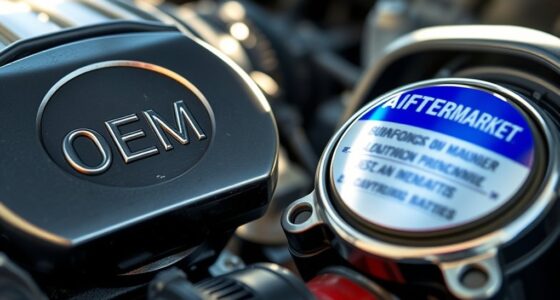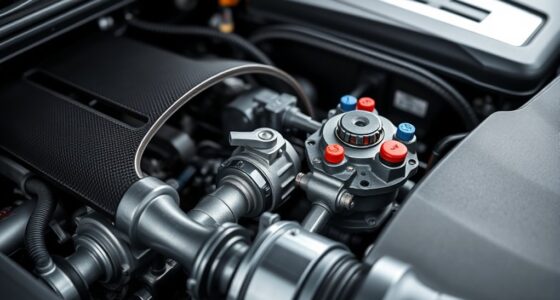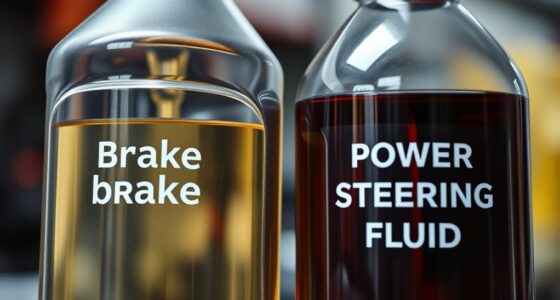You should use the octane rating your vehicle’s manufacturer recommends, often found in the owner’s manual. Higher octane fuels resist knocking better, but only benefit engines designed for it, like those with high compression ratios. Using premium fuel in a car that doesn’t require it usually costs more without improving performance or fuel economy. To find out what’s best for your car and discover more tips, keep exploring the details behind octane ratings.
Key Takeaways
- Use the octane rating recommended by your vehicle’s owner manual for optimal performance and efficiency.
- Higher octane fuels resist knocking but often do not improve fuel economy unless your engine requires it.
- Premium fuel is beneficial mainly for high-compression or turbocharged engines designed for it.
- Using lower octane than recommended can cause knocking, engine damage, and reduced efficiency.
- Outside conditions like towing or spirited driving may justify premium fuel in some high-performance vehicles.

If you’ve ever filled up your car and wondered what octane ratings really mean, you’re not alone. Octane ratings are a common source of confusion, but understanding them can help you make better choices at the pump. Essentially, octane measures a fuel’s ability to resist knocking or pinging during combustion. Higher octane fuels, like premium, are more resistant to knocking, which can be beneficial for certain engines. However, for most drivers, the key question is whether choosing a higher octane fuel will improve your vehicle’s fuel economy or engine performance.
In general, using a higher octane fuel than what your car’s manufacturer recommends doesn’t necessarily lead to better fuel economy. If your vehicle is designed to run on regular unleaded, filling up with premium won’t boost your miles per gallon. Instead, it could just be an unnecessary expense. That said, if your car’s engine has high compression ratios or features advanced timing, it might be optimized for higher octane fuels. In such cases, using premium can prevent knocking and help maintain smooth engine performance, especially under demanding driving conditions like towing or spirited driving.
When it comes to engine performance, the impact of octane ratings depends heavily on your vehicle’s design. Some engines are built to take advantage of high-octane fuel, delivering more power and efficiency when you use premium. If your owner’s manual specifies premium fuel, sticking to that recommendation ensures your engine runs as intended. Conversely, if your car only requires regular fuel, using premium won’t make it faster or more powerful. It might even waste money, since premium is usually more expensive.
It’s important to remember that engine performance isn’t solely about octane. Proper maintenance, tire pressure, and driving habits play significant roles. Using the right octane for your car helps the engine run smoothly and efficiently, but going beyond that won’t necessarily improve performance unless your engine specifically benefits from it. Additionally, lifestyle choices such as regular vehicle maintenance and safe driving can significantly influence overall engine health and efficiency.
Frequently Asked Questions
How Do Octane Ratings Affect Engine Performance in Different Climates?
In different climates, octane ratings influence your engine’s performance by affecting fuel stability and vapor pressure. Hotter environments can cause fuel to vaporize more quickly, potentially leading to knocking if the octane isn’t high enough. Cooler climates might not require premium fuel, but in extreme conditions, higher octane helps maintain stability and smooth operation. Always consider your vehicle’s needs and climate to choose the right octane rating for peak performance.
Can Using Higher Octane Fuel Improve Fuel Economy?
Like a knight in shining armor, higher octane fuel can seem tempting, but it often doesn’t boost your fuel efficiency or engine performance unless your car specifically demands it. If your vehicle’s manual recommends premium, you’ll notice better performance and possibly save fuel in the long run. Otherwise, sticking to regular fuel keeps your engine running smoothly without unnecessary costs, and you won’t miss out on any real benefits.
Are There Long-Term Engine Risks With Consistently Using Premium Fuel?
Using premium fuel consistently isn’t likely to cause long-term engine risks if your vehicle doesn’t require it. However, it can lead to unnecessary engine wear over time, especially if the fuel contains additional fuel additives that might not be suitable for your engine type. Always check your owner’s manual to confirm you’re using the recommended octane level, as using higher octane fuel unnecessarily can be costly without benefits.
How Does Octane Rating Relate to Emissions and Environmental Impact?
Higher octane ratings can lead to cleaner combustion, which supports emission reduction efforts and offers environmental benefits. When your vehicle runs on the appropriate octane fuel, it typically produces fewer pollutants like nitrogen oxides and carbon monoxide. Choosing the right octane level helps your engine operate efficiently while minimizing harmful emissions, making it a smart choice for environmentally conscious driving and reducing your carbon footprint.
Is Octane Rating More Important for Older Engines or New Models?
You might think octane rating is equally important for all engines, but it’s more critical for newer models designed for higher compression. Using the right octane guarantees engine compatibility and maximizes fuel efficiency. If you have an older engine, premium fuel might not offer benefits and could waste money. Always check your vehicle’s manual to determine the ideal octane rating for peak performance and efficiency.
Conclusion
In the end, choosing the right octane rating depends on your car’s needs. If your vehicle calls for premium fuel, skipping it is like putting a square peg in a round hole—you won’t get the best performance. Remember, “a stitch in time saves nine.” Using the proper octane guarantees your engine runs smoothly and efficiently, saving you money and trouble down the road. Trust your owner’s manual and make the smart choice for your car’s health.









